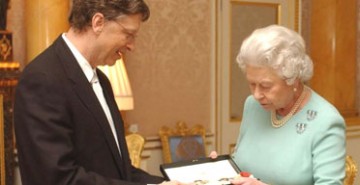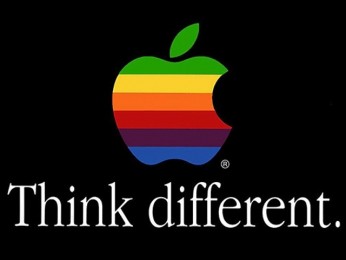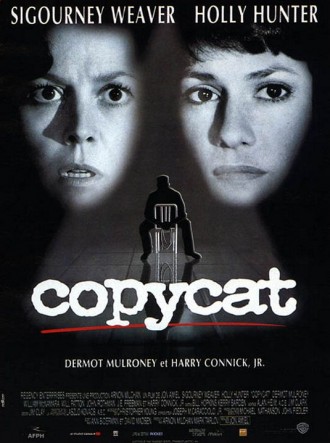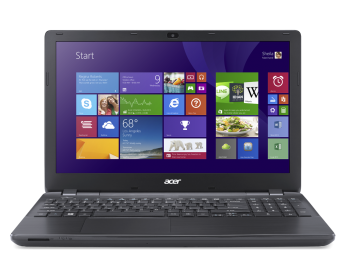 AMD has been making a big noise about its Kaveri chip range of Mobile APUs and we got a look at what it could do to Acer E5-551 15.6 laptop.
AMD has been making a big noise about its Kaveri chip range of Mobile APUs and we got a look at what it could do to Acer E5-551 15.6 laptop.
AMD A-Series APU family, codenamed Kaveri, is starting to pop up in systems from Acer, Asus, Dell, HP, Lenovo, Samsung, and Toshiba. According to AMD, the new mobile APUs mark the debut of Heterogeneous System Architecture (HSA) features and Graphics Core Next (GCN) Architecture for mobile. Acer’s Aspire E5 is first to arrive in the UK and will be sold through Debenhams so this makes it interesting from a user or a channel perspective.
The AMD A8 Kaveri chip is now powering the new Acer E5-551 laptop is designed for multi-tasking from gaming and light photo-editing to running multiples instances of software and streaming music. The E5-551 features a DVD reader and writer for long plane flights where you need a better movie. It is also well placed for the school market as it can practically anything a school kid could throw at it.
The machine is priced for about £409 which makes it a good budget model for smaller companies who are providing portables for those who have to do work, rather than just look at tablets. Normally there is not much between computers in this range. Most have WXGA screens based on TN technology and conventional hard drives and plastic bodies.
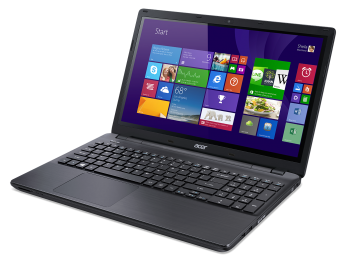 The Spec
The Spec
Processor: AMD Quad-Core A8-7100
Mainboard: AMD A76M
Memory: 8192 MB, DDR3L, 1600 MHz, dual-channel, 2 memory banks, both filled
Graphics adapter :AMD Radeon R6 (Kaveri), Core: 533 MHz, DDR3L, shared memory, bus: 64 Bit
Display: 15.6 inch 16:9, 1366×768 pixel, AU Optronics AUO47EC, TN LED
Connections: 2 USB 2.0, 1 USB 3.0, 1 VGA, 1 HDMI, 1 Kensington Lock, Audio Connections: 1 combo audio in/out, 3.5 mm jack, Card Reader: SD/SDHC/SDXC,
Networking: Realtek RTL8168/8111 Gigabit-LAN (10/100/1000MBit), Atheros Communications AR9565 Wireless Network Adapter (b g n ), 4.0 Bluetooth
Optical drive: Matshita DVD-RAM UJ8E2Q
Operating System: Microsoft Windows 8.1 64 Bit
Weight: 2.5 kg
Battery: 56 Wh Lithium-Ion
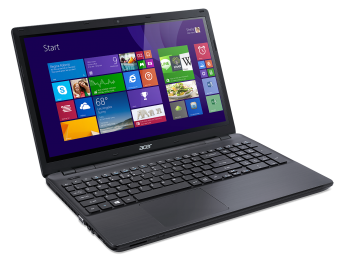 Design
Design
The Aspire A5 design is, bluntly, a bit of a snooze and not its strongest feature. Certainly, it is thinner than many laptops in this range but it is not that thin. It is lighter and easy to carry than others we have had. Certainly in comparison to the bricks that are available in this price range it is certainly not bad. Besides, for £409 design is something that happens to other people’s computer.
The plastic case also seems to pick up every type of grease that a hand can generate and make the machine slimy.
The chip
The important part of this computer is an AMD Quad-Core A8-7100 which is a quad core with eight GPU cores to carry out the AMD Radeon R7 series graphics. The idea of the Heterogeneous System Architecture (HSA) is that it allows the CPU and GPU to work together by quickly dividing and directing the right tasks toward the appropriate cores to improve performance and efficiency. The chip managed to make running software a breeze and it even passed our Firefox running trillions of opens tabs trick without any problems.
The Graphics
The graphics on the Kaveri platform is far better than Intel’s equivalent HD graphics cores integrated into the Haswell chips. This makes Kaveri armed laptop owners able to play reasonably demanding games and videos. Playing Civ 5 was not only possible it was a quality game on Acer E5-551, something that I have only seen on our other home laptop, which has a dedicated card, when there was nothing else running. HD films came out very well, limited only by the screen which for a budget machine was still not too bad.
Connectivity
The machine has an HDMI socket, Ethernet connection, two USB 2.0 sockets, a USB 3.0 connection and a VGA out. Not bad not great.
Communication
The Atheros AR9565 Wi-Fi module supports the IEEE 901.11 b, g and n standards, Bluetooth, version 4.0. The signal connections were fairly standard and nothing to right home about
Battery
The 56 Wh Lithium-Ion managed 4.5 half hours before needing a recharge, which was not too bad given the thrashing we were giving it. Again, this is due to the lower power draw of the AMD A8 chip.
Noise and heat
There was no noise coming from the machine at all. This was unheard of in any laptop in this price range, particularly one with an ordinary hard drive. One could almost believe it is fanless. The heat levels were also not to bad. The laptop did get warm, but not hot and was comfortable to put on your lap.
Keyboard
The flat, roughened keys were not bad and were capable of fast touch typing.
Touchpad
The ClickPad which is a large, single-surface which you press when you want to ‘click’ was reasonable in comparison to the alternatives we have used. Generally, if you are not going to have a touch screen on a laptop you are always going to be better with a mouse. When such use was impossible though once you got used to it was fine. Most of the touchpad surface can be pressed, which is interpreted as a left click except for in the lower right of the Clickpad.
Hard-drive
The hard drive is 1TB which is more than enough for any portable music or movie collection. It is not an SSD but we never heard it in operation.
Summery
The Acer E5-551 would be a normal budget laptop where it not for the Kaveri chip making it into something special. It enabled speed, enhanced graphics, extended battery life, and quiet operation something which we have not seen from Intel equivalents in the market. It is still a budget machine, limited by the lack of a quality screen, but for that price it it is jolly useful.
The Eyes have it

Good value for money.
 The EU Justice Commissioner is considering suspending a commercial data-sharing agreement between the European Union and the United States if Washington doesn’t stop spying.
The EU Justice Commissioner is considering suspending a commercial data-sharing agreement between the European Union and the United States if Washington doesn’t stop spying.




